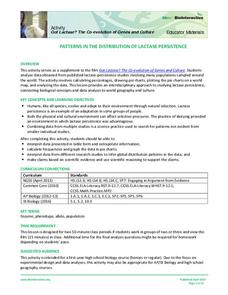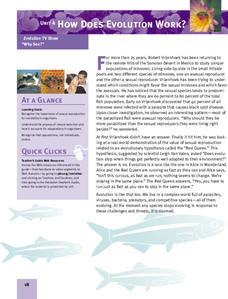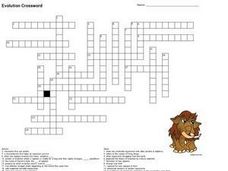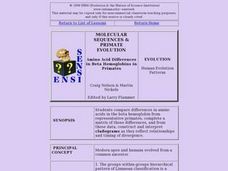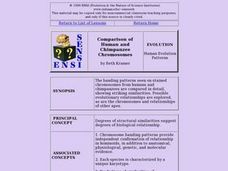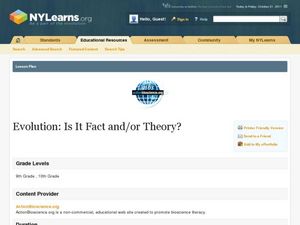California Academy of Science
Color Vision Genetics Evolution Simulation
At one point, all mammals carried only two color receptors, but now most humans carry three. An informative presentation and hands-on activity demonstrate how this evolved through genetics. By participating in the activity, pupils...
Howard Hughes Medical Institute
Patterns in the Distribution of Lactase Persistence
We all drink milk as babies, so why can't we all drink it as adults? Examine the trend in lactase production on the world-wide scale as science scholars analyze and interpret data. Groups create pie charts from the data, place them on a...
Howard Hughes Medical Institute
Fact Patterns: A Film Guide
What does it take to create a scientific theory? Learners attempt to answer the question by studying the work of Charles Darwin and Alfred Russel Wallace. While watching a video, they track observations from each scientist and then look...
Curated OER
Patterns of Evolution and Selection
Can your young biologists interpret population graphs, match macroevolution patterns and descriptions, and answer multiple choice questions about evolution? Find out with a comprehensive three-page quiz covering some specific examples of...
Curated OER
How Does Evolution Work?
Students are introduced to how the process of evolution works. As a class, they review the characteristics of natural selection and how those with advantageous traits reproduce and survive. To test this theory of natural selection,...
Curated OER
Evolution Crossword
In this evolution crossword worksheet, 7th graders complete a crossword puzzle about evolution. Students read the definitions to fill in the puzzle with evolution terms.
Curated OER
Classroom Cladogram of Vertebrate/Human Evolution
Students build a Colossal Classroom Cladogram of vertebrate evolution. After putting it together, they show the gradual, mosaic accumulation of the traits which we, as humans, possess.
Curated OER
PRIMATE CLASSIFICATION: Evolution, Cladograms,
Students transfer examples (names) of primates from their location in an outline hierarchy of primate groups into a set of nested boxes reflecting that same hierarchy. A cladogram can then be drawn illustrating how these groups are...
Curated OER
Evolution Lab
Students examine the pattern of natural variation in a society. They examine Darwin's theory of evolution and analyze data. They use computer programs to graphically display the variation in organisms.
Howard Hughes Medical Institute
Visualizing Gene-Expression Patterns
How do genetics gurus know so much about gene expression? See traits materialize before your very eyes using a presentation with embedded simulations. Science scholars develop an understanding of the techniques used to follow the work of...
Curated OER
Genes within Populations
Finally, here is a genetics worksheet that does not include Punnett squares! Designed for a more advanced class, biology learners will compare Lamarck's concept of evolution with Darwin's. They will explore the Hardy-Weinberg equilibrium...
Howard Hughes Medical Institute
Survival of the Fittest - Variations in the Clam Species Clamys sweetus
It's not often that you come across a clever laboratory activity that is both imaginative and comprehensive! Using M&M's and Reese's peanut butter candies to represent two different clam species, young biologists test for "relative...
Curated OER
Why Is Evolution Controversial?
Learners explore why evolution has always been a controversial topic. They use scientific process to determine patterns and to critically analyze alternative explanations for natural phenomena.
Curated OER
Molecular Sequences & Primate Evolution: Amino Acids, Hemoglobins in Evolution
Students compare differences in amino acids in the beta hemoglobin from representative primates, complete a matrix of those differences, and from these data, construct and interpret cladograms as they reflect relationships and timing of...
Curated OER
Time Machine: Evolution, Geology
Learners are taken on a simulated "voyage" backward in time, to the beginning of our planet. They "witness" that beginning, the origin of life, and a number of key events from then to the present.
Curated OER
VARVES: Dating Sedimentary Strata: Geology, Paleontological Patterns
Students count the number of varves (annual layers of sediment) in shale billets, taken from the Green River Formation in Wyoming. The count is then extended to reflect the entire 260 meters of sediments where the billets originated.
National Endowment for the Humanities
Arabic Poetry: Guzzle a Ghazal!
Students research the evolution and cultural significance of the Arabic ghazal form of poetry. They, in groups, compose an original ghazal poem and read it aloud to the class.
Curated OER
Comparison of Human and Chimpanzee Chromosomes
Students actively engage in the careful analysis of chromosome banding patterns and identify examples of inversion in homologous chromosomes.
Curated OER
Mimicry: An Example of Adaptation
Students are able to explain the relationship between adaptation and ability for survival and reproduction. They are able to give examples of a series of adaptations that would support the idea that evolution is a series of minor...
Space Awareness
Star in a Box
What happens to stars as they get older? A simulation takes pupils through the life cycle of stars based on their masses. The resource introduces the Hertzsprung-Russell diagram and the common relationships and life cycle patterns observed.
Curated OER
Island Biogeography and Evolution
Learners develop likely phylogenies for seven related populations of lizards living on the Canary Islands using real data. They organize charts, and record the data for geography, geology, morphology, and molecular genetics.
Curated OER
PATTERNS IN TIME
Learners build a realistic sense of geological time, seek clues of transition fossils and find them. For this investigative lesson students complete several activities and worksheets on fossils.
Curated OER
Evolution: Is It Fact and/or Theory?
Students explore the concepts of evolution. In this biology lesson, students read articles from the internet. They discuss the article within the group and answer their handouts.
Curated OER
Evolution in Action!
Learners use the Internet to complete an interactive simulation about evolution. They follow certain species and discover the process of natural selection. They answer questions to test for comprehension.

